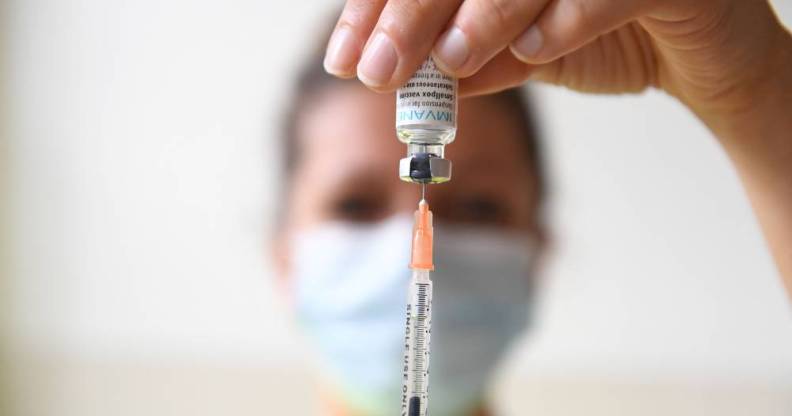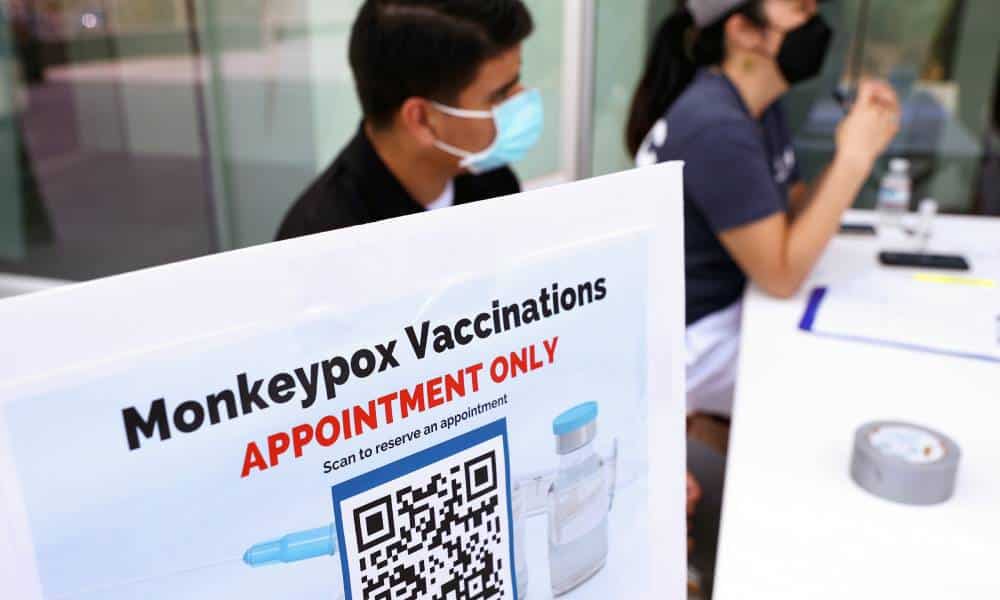World Health Organization to rename monkeypox amid stigmatisation concerns

The World Health Organisation says it’s opening a forum for the public to suggest new names for monkeypox. (Alain Jocard/Pool/AFP via Getty)
The World Health Organization (WHO) is creating an open forum to rename monkeypox over concerns that the current name could be generating stigma and discrimination.
WHO said the decision was made after meeting with a group of “global experts” this week and in line with current best practices for naming diseases.
The organisation said the goal of renaming monkeypox variants is to “avoid causing offense to any cultural, social, national, regional, professional, or ethnic groups, and minimize any negative impact on trade, travel, tourism or animal welfare”.
WHO said the new names for the monkeypox clades will “take effect immediately”. The health agency announced it was also opening a forum for the public to suggest new names for the disease, the Associated Press reported.
However, WHO hasn’t given any timeframe on when monkeypox will be officially renamed.
Newly identified viruses, related diseases & virus variants are given names to avoid causing offence to any cultural, social, national, regional, professional, or ethnic groups, & minimize the negative impact on trade, travel, tourism, or animal welfare. https://t.co/1QzTi41iEc
— World Health Organization (WHO) (@WHO) August 13, 2022
WHO said the monkeypox virus was first named in 1958 when monkeys in a Danish laboratory were observed to have a ‘pox-like’ disease. The organisation said this was “before current best practices in naming diseases and viruses were adopted”.
There have been more than 31,799 cases of monkeypox identified globally to date since the beginning of the current outbreak, which started in May.
WHO declared monkeypox a public health emergency of international concern in July. The US federal government has since declared monkeypox a public health emergency as the Centers for Disease Control and Prevention (CDC) reported over 11,177 confirmed cases in the country.
The decision to rename monkeypox comes after a group of scientists in June proposed a “speedy” adoption of a new name to combat anti-African stigma and racism around the disease.
They said there was “growing evidence” that monkeypox has been spreading human-to-human across Europe “for longer than previously thought”. As such, the scientists said the current outbreak shouldn’t be linked to Africa because such links are “discriminatory and stigmatising”.
“In the context of the current global outbreak, continued reference to, and nomenclature of this virus being African is not only inaccurate but is also discriminatory and stigmatising,” the scientists wrote.
The group believed a new name that is “neutral, non-discriminatory and non-stigmatizing” will be “more appropriate” going forward.

Officials have called for monkeypox to be renamed to something that is “neutral, non-discriminatory and non-stigmatizing”. (Getty/Mario Tama)
Monkeypox has so far disproportionately impacted queer men though health experts have emphasised that anyone can get monkeypox, warning against reinforcing “homophobic and racist stereotypes”.
The CDC has said scientists are still researching if monkeypox can be “spread through semen, vaginal fluids, urine, or feces”.
However, public health officials know the virus can spread through close, personal – often skin-to-skin – contact. This can include direct contact with monkeypox rash or scabs; touching objects, fabrics and surfaces; and contact with respiratory secretions.
The CDC said direct contact can happen during sexual contact of a person with monkeypox, hugging, massaging, kissing and prolonged face-to-face contact.
People should ensure that they disinfect bedding, towels, fetish gear, sex toys and other fabrics and objects used during sex.
The Biden administration promised to ensure LGBTQ+ people are “respected and heard” in its response to the growing outbreak.
Dr Demetre Daskalakis, the monkeypox response deputy coordinator, told PinkNews that it is the role of the government and governmental public health to “be a role model” to help the media “have language that works”, so “we don’t propagate stigma” that “can last for decades”.

